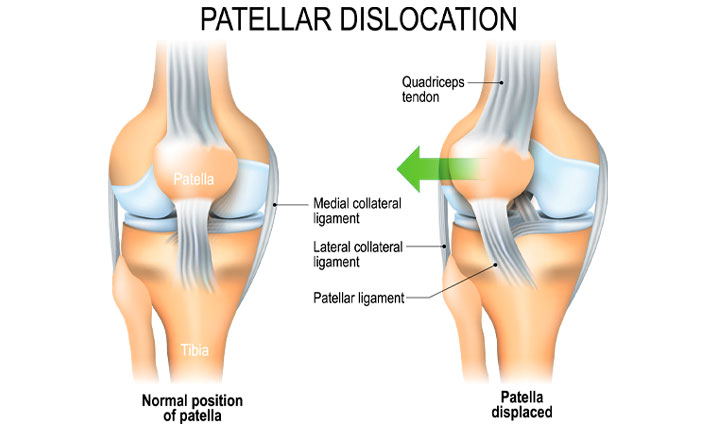- Home
- Knee Cap Dislocation
Knee Cap Dislocation
About Kneecap Dislocation
A dislocated kneecap is a common injury when a person changes direction suddenly with their feet planted on the ground — such as during sports or when dancing.
Research suggests that a first-time dislocation of the kneecap can take at least 6 weeks Trusted Source to heal. The time depends on the necessary treatment and any factors that suggest that the injury may reoccur. Some people also require extensive physical therapy.
Below, we explore the symptoms, treatment options, and recovery timeline for a dislocated kneecap. We also look into the risk factors for a recurrent injury.

Outlook
The right approach to treatment and the timing of recovery varies, depending on severity of the dislocation.
A person who has experienced one kneecap dislocation has an increased risk of another. Even after making a full recovery, a person may need to continue to strengthen the muscles that surround the knee to help prevent a recurrent injury.
Having surgical treatment may reduce the risk of future dislocations, in some cases, but it carries other risks. Discuss all treatment options and their long-term effects with a doctor.
Working closely with a doctor and a physical therapist can help ensure a smooth recovery and minimize the chances of reinjury.
BOOK AN APPOINTMENT
“KNEEO Technique” For Knee Replacements
Symptoms of a Dislocated Knee cap
The symptoms depend on the severity of the dislocation and whether there is damage to surrounding structures.
If the injury is less severe, the kneecap may only partially dislocate before returning to its original position. This is called a subluxation, and the person may be able to return to their regular activities fairly quickly.
Symptoms of a partial dislocation may include:
- the feeling that the kneecap has slipped to one side
- pain, especially at the front of the knee
- popping or crackling sounds in the knee
- stiffness and swelling
- a locking or catching sensation in the knee
- a feeling of instability
When the kneecap has fully dislocated, the person may:
- find that their knee has an odd, angular appearance
- have moderate to severe pain
- feel a strong popping sensation in their knee
- experience severe stiffness and swelling
- find that their knee locks, making it difficult or impossible to move the leg
- be unable to walk or stand
Anyone with symptoms of a partial or full dislocation should receive medical attention.
Even if the kneecap shifts back into place on its own, a doctor needs to ensure that the other structures in the knee are correctly aligned and undamaged. This requires an X-ray.


